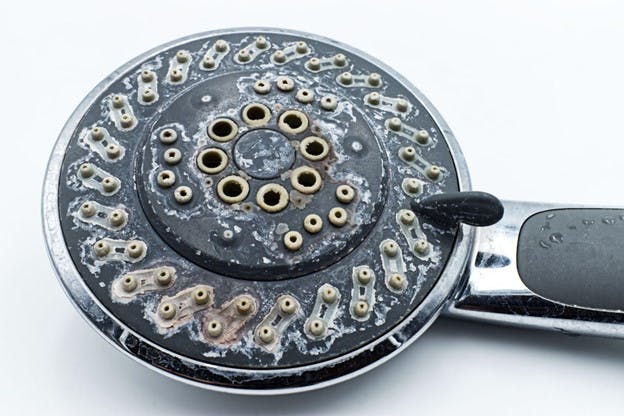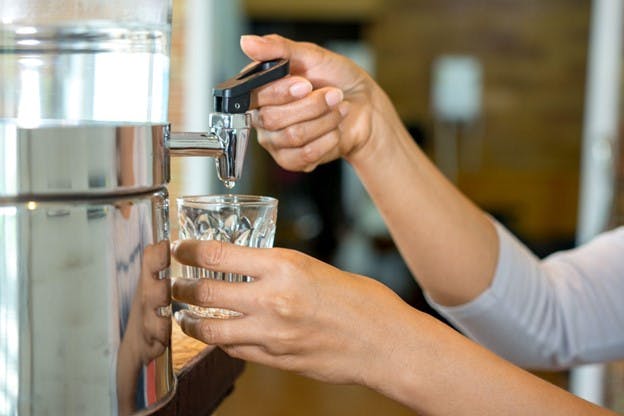June 2023
Do You Need Deionized Water in Your Home?
The water on our planet is incredibly old. Current science says it’s been around for 4.5 billion years, give or take a few weeks. Not only is it old, but it’s even getting a little crusty. Water is an excellent solvent and as it travels around the globe it picks up tiny fragments of rocks and minerals. If you are dealing with hard water in your home, you know about this firsthand. All that crusty stuff on your showerheads and surfaces are the minerals being left behind.
While these minerals can be a pain point in our home lives, they can lead to much bigger problems during manufacturing processes or sciences where water impurities can muck everything up. Luckily for us, we have ways to get rid of these minerals. The most popular way to do it is to deionize the water. Deionized water (DI water) uses ion exchange technology to remove a bunch of contaminants but not all of them.
In this article we want to look at how deionization works, how it differs from other types of water filtration, and see if there are any health benefits to drinking it. Finally, we’ll show you why a multistage approach to water filtration in our homes is usually best.
What Is Deionized Water?
Water deionization is a method of ion exchange that works to rid water of dissolved minerals and salts. Minerals and salts have positively and negatively charged ions called cations (positive) and anions (negative). Deionizing water removes the dissolved mineral ions and replaces them with positively charged hydrogen and negatively charged hydroxide ions. The new ions combine back into pure H2O.
Some of the common impurities removed by this water treatment include cations like:
- Calcium
- Magnesium
- Sodium
- Potassium
- Iron
- Manganese
- Ammonium
And anions like:
- Chloride
- Sulfate
- Nitrate
- Bicarbonate
- Carbonate
- Phosphate
- Silicate
Removing hard water ions from the water will soften it, reduce the total dissolved solids (TDS), and reduce the electrical conductivity, resulting in high-purity water. This makes deionized water much less damaging to your home’s pipes and water-using home appliances and much more useful for many scientists, the pharmaceutical industry, and other manufacturers who need very clean water.
How Does Water Deionization Work?
The deionization process occurs when water passes over a special resin bed made of thousands of tiny resin beads. The beads pull negatively and positively charged ions out of the water and replace them with hydrogen and hydroxide (which combine to make water).
The mineral ions stick to the resin in the DI system. Over time, this can make the resin less effective so it will need to go through a regeneration process every so often or be replaced. If you're familiar with traditional home water softeners, you’ll know that salt is used to regenerate the resin bed.
How Does Deionization Differ From Other Water Purification Methods?
While there are countless ways to purifywater — like UV light filters, chlorine and chloramine, and kinetic degradation fluxion (KDF) media — there are only a few ways to get true purified water. The three most common filtration methods are distillation, reverse osmosis, and deionization. These terms are often interchanged for simplicity even though it'snot quite right to do so.
Is Deionized Water the Same as Distilled Water?
No. When water is distilled, it is boiled and the steam is captured. When water is boiled, the steam escapes, leaving behind many of the original contaminants. Once the steam is captured by a cooling system that turns it back into water, most of the impurities in the new water will have been filtered out.
While distillation is very effective at removing minerals and salts, and even some things deionization doesn’t remove, distilled water is not the same as deionized water. Instead of steam, deionization involves passing water through a resin bed which exchanges charged mineral ions with hydroxide and hydrogen. Deionized water and distilled water also have different profiles because, while there's overlap, they excel at removing different contaminants.
Distillation also has disadvantages to deionization. The biggest is the amount of energy it uses to heat and cool the water.
Do Reverse Osmosis Systems Deionize Water?
Reverse osmosis (RO) systems are very effective at removing minerals, salts, and just about every other water contaminant but they are not deionizers. In a reverse osmosis system, water is forced through a membrane with super tiny pores. These holes are so small that almost nothing but the water molecules can get through, so the water that comes out is very pure.
Reverse osmosis systems do end up removing a lot of ionized minerals but they also have some disadvantages when compared to deionizers. The membranes can get clogged and wear out, so it’s good to prefilter water with other technologies before it reaches the RO system. It can also be time-consuming to push a large amount of water through the membranes.
What Are the Disadvantages of Water Deionization?
Deionizing water is a very good at removing ionized contaminants but it doesn’t remove anything non-ionized like:
- Organic compounds
- Viruses
- Bacteria
- Larger particles and sediment
This is why most quality home filtration systems like the ones sold by HomeWater are multistage filters. HomeWater filters utilize catalytic carbon, reverse osmosis, KDF media, and more. We use these technologies together in a well-thought-out way that maximizes the effectiveness of each of them to handle the impurities that matter to you.
Is It Better to Drink Ionized Water?
There are marketers who claim drinking deionized water has many extraordinary health benefits. You’ll usually see the word “alkaline” thrown around in the marketing. People claim it has anti-aging benefits and improves bone strength, and even cures many diseases. But is deionized water really a miracle worker?
Not really — or at least it hasn’t been proven if it does have these health benefits. In fact, deionized water (or demineralized water) has many health-positive minerals removed from it like calcium and magnesium. These minerals are used by our bodies for all sorts of things like (ironically) building strong bones and carrying messages from our nerves to our muscles.
Should I Deionize My Tap Water?
Deionizing water is a process used by laboratories to almost completely demineralize water to make it less conductive. They do this for very specialized reasons.
Unless you have very specific home hobbies like aquascaping reef aquariums, a car detailing business, or a home laboratory, it's not likely that you’ll benefit from having a home deionizer.
Deionizers won’t get rid of what many people are more concerned about like chlorine, bacteria, viruses, and organic compounds. This is where multi-stage home water filters shine.
For most homes in the U.S. and Canada, the only minerals that we need to worry about are hard water minerals. A traditional water softener uses similar technology as a deionizer but it's more targeted to remove just the hard water minerals that give us trouble in our day to day lives.
Should I Use a Water Softener?
If you live in the U.S. or Canada, there’s a good chance you have hard water. Hard water minerals wreak havoc on pipes and lower the lifespan of water-using appliances — but that’s not all. Here are a few of the ways hard water makes our lives “harder” and costs us money:
- Creates crust and film on surfaces that's hard to remove
- Encourages soap scum buildup and mold
- Wears out the fibers in clothing
- Damages hair and skin
- Leaves spots on surfaces like dishes or car paint
- Clogs up water filters
- Makes soap less effective so you need more of it to get a good lather
- Causes corrosion and rust stains
If you’re dealing with hard water, a water softener or a salt-free water conditioner is a great addition to a water filtration system. Once you have it, you won’t know how you went without one for so long.
Is It Safe to Drink Ionized Water?
Deionized water is generally safe to drink but you’ll probably notice it tastes flat and not very pleasant since it lacks the minerals we’re used to in our water supply. Water that lacks minerals will also pull from everything it comes in contact with including metal pipes, plastic bottles, and even your teeth. While consuming water with an ultra-high magnesium content can cause diarrhea, most tap water in the U.S. and Canada isn’t high enough to cause these negative health effects.
Demineralized water, while it won’t hurt you to drink, has no known health benefits and it removes many beneficial minerals. For drinking water, concentrate on getting high-quality filtered water and leave the deionized water to hobbyists and scientists.
Why Are Multi-Stage Water Filters Better for Drinking Water?
Deionization is an excellent way to remove charged ions and minerals from water but that’s about it. Deionization isn't effective at removing chlorine, bacteria, viruses, or larger particulates like sediment. That's why a multistage approach to water filtration is usually the best choice for your home.
HomeWater’s 4-Stage Reverse Osmosis Under Counter Water Filters are calibrated to reduce the contaminants at your faucet that matter most to you: sediment, dirt, chlorine, dissolved inorganics, barium, cadmium, hexavalent and trivalent, chromium, lead, copper, radium 226/228, selenium, fluoride, and nitrate/nitrite. This makes your drinking water cleaner and more delicious than ever.
Or you can install our UPSTREAM 4-Stage Whole Home Water Filter with add-on salt-free water conditioner and protect every tap, appliance, and pipe in your home. These American-made filtration systems are easy to install and maintain, don’t use electricity, and don’t get in the way of your water pressure.
With HomeWater, you get tasty, high-quality drinking water every time you turn on your tap.


